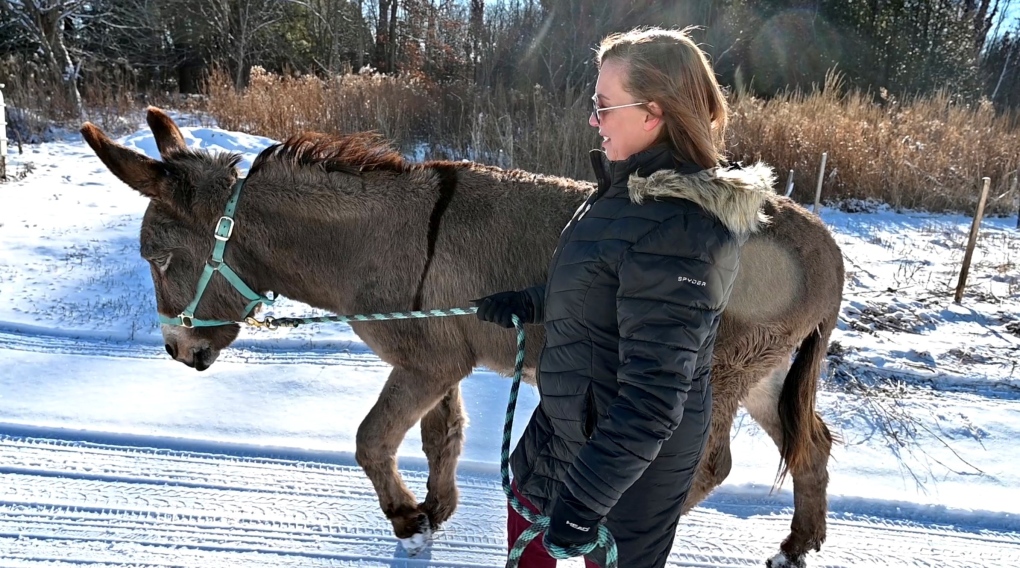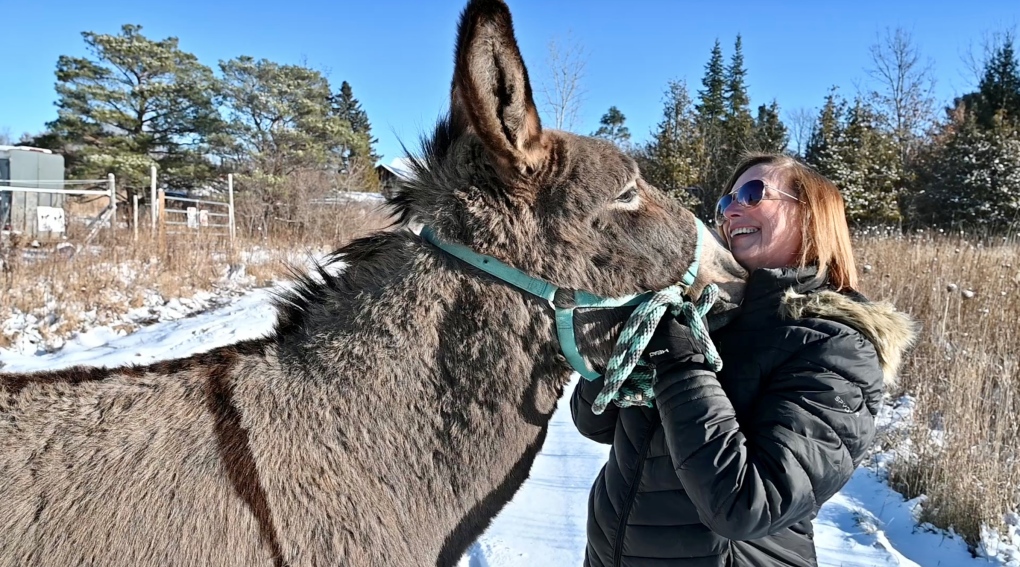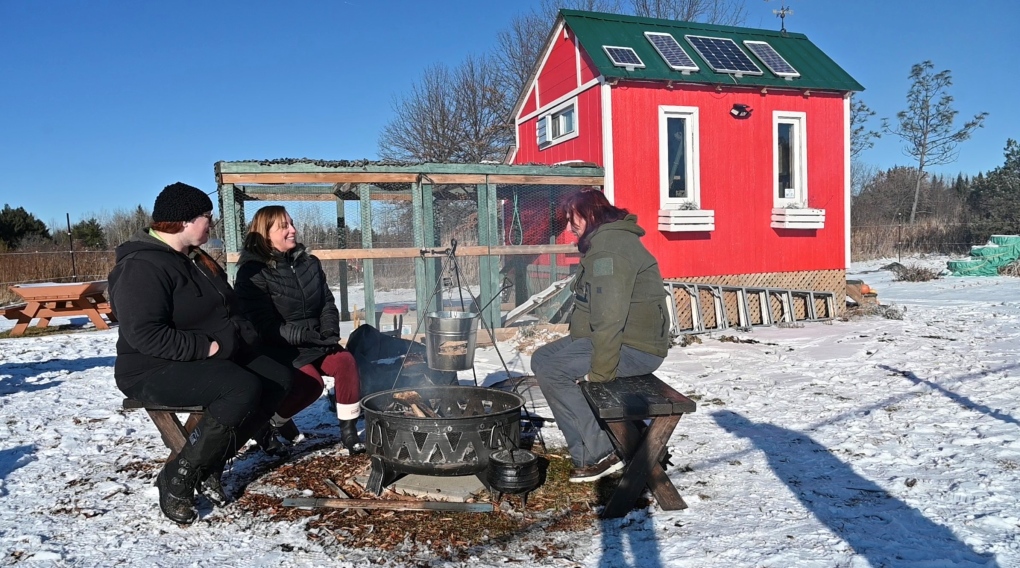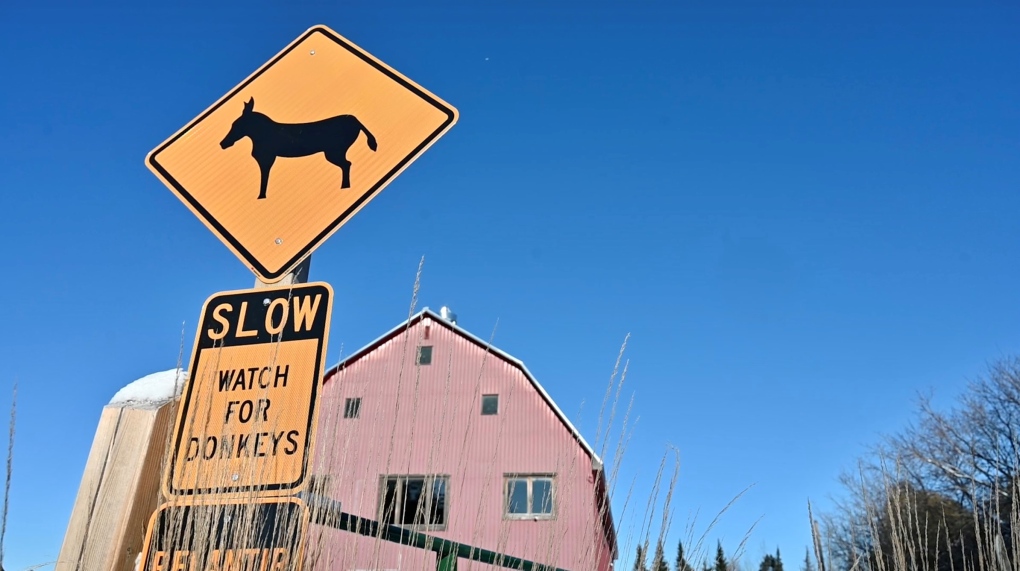A friend named Bert: A Canadian veteran living with PTSD finds hope in a donkey
Karen Stacey swings wide a creaky, stainless steel gate, announcing her arrival.
“Good morning, Bert. Are you still sleeping?”
She’s come to see a friend; a soulmate of sorts, who’s changed her life.
“Hi, buddy,” she says with a smile.
Bert turns his head toward her, clearly recognizing his visitor.
His ears point to the sky.
“Hello, handsome,” Karen whispers.
She locks her arms around his neck and gives him a gentle peck between the eyes.
“He’s a blessing. I couldn’t have asked for a better success story than to have a donkey as my best friend.”
 Karen Stacey, a Canadian Forces veteran living with PTSD, enjoys a gentle stroll with her friend Bert (Joel Haslam/CTV Ottawa)
Karen Stacey, a Canadian Forces veteran living with PTSD, enjoys a gentle stroll with her friend Bert (Joel Haslam/CTV Ottawa)
Karen still remembers the first time she and Bert met.
“Bert came up to me and gave me the biggest hug I have ever had in my life,” she says.
“I melted and said, ‘This is for me.’”
Karen is living with PTSD. She is a veteran of the Canadian Forces, doing her best to live with a painful past.
“At the very beginning of my career, I was abused. I was 24 years old,” she says.
Though traumatized, Karen felt reporting her abuse would have further costs. Disclosing her mental health challenges was not an option.
“I had a security clearance and if there was something wrong with my mind, then I compromised my security clearance.”
So Karen did her best to live with her anxiety. She kept busy. She kept to herself.
“Everything was hush, hush,” she says.
But when she became seriously injured during a training exercise, it all became too much.
“A 60-pound rucksack just collapsed my spine, so I have huge disc deterioration and chronic pain. At one point, I was up to 36 pills a day, but they just didn’t work,” she says.
“After I had my back injury, everything went quiet. And then I had to reach out and say ‘Ok, I’ve got a mental health issue,” she says.
Karen tried conventional physical and psychotherapies. They were helpful, but she found she needed more.
That’s when Karen found Bert.
 Karen Stacey pauses to hug Bert the service donkey during a walk at the Women Warriors Healing Garden (Joel Haslam/CTV Ottawa)
Karen Stacey pauses to hug Bert the service donkey during a walk at the Women Warriors Healing Garden (Joel Haslam/CTV Ottawa)
“He has no judgement and keeps me really happy. He gives you all the love you need.”
Bert isn’t a pet. And he’s much more than a farm animal. He’s part therapist, a best friend to people in pain, like Karen.
“He’s a special guy. I don’t know if every donkey is the same, but we love our Bert,” she smiles.
Karen and Bert’s friendship began at the Women Warriors Healing Garden in Blackburn Hamlet.
“It still hurts. So, finding this place and being able to let everything go is fantastic. This is 52 acres of freedom that I can wander as I want. No judgement, no stress, no pain. Just a lot of love,” she says.
Co-founded by an American military veteran, Erin Kinsey, and an Ottawa psychotherapist, Elaine Waddington Lamont, the garden is a place for veterans to heal.
 Co-founders of the Women Warriors Healing Garden, Elaine Waddington Lamont (left) and Erin Kinsey (right) share a fireside chat with Karen Stacey (centre) at the Women Warriors Healing Garden. (Joel Haslam/CTV Ottawa)
Co-founders of the Women Warriors Healing Garden, Elaine Waddington Lamont (left) and Erin Kinsey (right) share a fireside chat with Karen Stacey (centre) at the Women Warriors Healing Garden. (Joel Haslam/CTV Ottawa)
“Whether a person’s a woman, or LGBTQ, we don’t leave people on the battlefield injured. We get them help,” says Kinsey.
The Healing Garden offers veterans countless ways to connect with nature and the environment.
They can garden, learn bee keeping, tend a chicken coop, take art therapy courses, or walk with Bert
Lamont says the experiences take them away from their pain and help them give focus to living in the moment.
“Part of healing is learning where safe places are through your senses,” says Waddington Lamont.
“They realize ‘the things that I’ve lived through, the challenges, they’re not here right now, and I can feel safe. I can take some steps towards recovery and healing.’”
According to Waddington Lamont, women represent about 15 per cent of the serving members of the Canadian Forces, and about 15 per cent of veterans.
“A minority in number and they have been traditionally underserved in terms of programs available to them,” she says.
“Unfortunately, sometimes women and members of the 2SLGBTQ community will have experienced injuries related to sexual trauma or sexual harassment and they may not feel comfortable in a group of other veterans that may include men,” she says.
“This offers them a space of their own.”
“This is somewhere where people can come and engage in post traumatic growth,” says Kinsey.
“They can build relationships with other vets; true, deep relationships. They can feel empathy for each other and the animals. It demonstrates we’re all part of a process of getting better.”
That empathy is undeniably visible between Karen and Bert.
“Donkeys really do have their favourite people and Karen and Bert are really connected,” says Kinsey.
“He wants to cuddle and snuggle her and just be right by her side. She is his person,” says Waddington Lamont.
 A sign at the Women Warriors Healing Garden, home to Bert the service donkey (Joel Haslam/CTV Ottawa)
A sign at the Women Warriors Healing Garden, home to Bert the service donkey (Joel Haslam/CTV Ottawa)
And Karen Stacey believes Bert is helping her get better.
“He feels me,” she says.
“If my heartbeat starts to race, he’ll stop. He won’t budge. And he’ll just want me to hug him. So, I’ll hug him and pet him and he’ll put his face in my face and we’ll walk on.”
Karen says she’s walking on to a better place.
“Bert just gives me peace.”
And for this soldier, that’s everything.
Karen’s donkey is her hero.
“He knows a broken heart when it comes around and he’s fixed it.”
CTVNews.ca Top Stories

opinion Tom Mulcair: Prime Minister Justin Trudeau's train wreck of a final act
In his latest column for CTVNews.ca, former NDP leader and political analyst Tom Mulcair puts a spotlight on the 'spectacular failure' of Prime Minister Justin Trudeau's final act on the political stage.
B.C. mayor gets calls from across Canada about 'crazy' plan to recruit doctors
A British Columbia community's "out-of-the-box" plan to ease its family doctor shortage by hiring physicians as city employees is sparking interest from across Canada, says Colwood Mayor Doug Kobayashi.
'There’s no support': Domestic abuse survivor shares difficulties leaving her relationship
An Edmonton woman who tried to flee an abusive relationship ended up back where she started in part due to a lack of shelter space.
opinion King Charles' Christmas: Who's in and who's out this year?
Christmas 2024 is set to be a Christmas like no other for the Royal Family, says royal commentator Afua Hagan. King Charles III has initiated the most important and significant transformation of royal Christmas celebrations in decades.
Baseball Hall of Famer Rickey Henderson dead at 65, reports say
Rickey Henderson, a Baseball Hall of Famer and Major League Baseball’s all-time stolen bases leader, is dead at 65, according to multiple reports.
Arizona third-grader saves choking friend
An Arizona third-grader is being recognized by his local fire department after saving a friend from choking.
Germans mourn the 5 killed and 200 injured in the apparent attack on a Christmas market
Germans on Saturday mourned the victims of an apparent attack in which authorities say a doctor drove into a busy outdoor Christmas market, killing five people, injuring 200 others and shaking the public’s sense of security at what would otherwise be a time of joy.
Blake Lively accuses 'It Ends With Us' director Justin Baldoni of harassment and smear campaign
Blake Lively has accused her 'It Ends With Us' director and co-star Justin Baldoni of sexual harassment on the set of the movie and a subsequent effort to “destroy' her reputation in a legal complaint.
Oysters distributed in B.C., Alberta, Ontario recalled for norovirus contamination
The Canadian Food Inspection Agency has issued a recall due to possible norovirus contamination of certain oysters distributed in British Columbia, Alberta and Ontario.


































